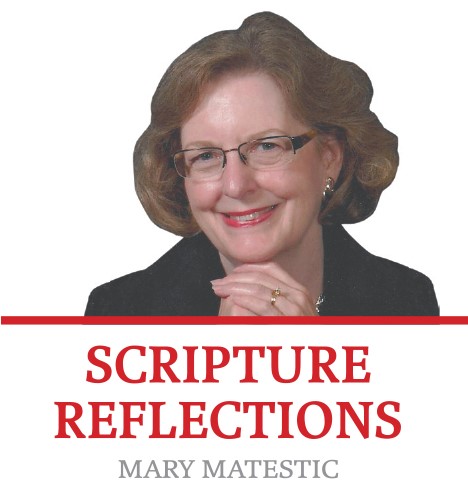Scripture Reflection, Sunday, Oct. 17, 2021
29th Sunday of Ordinary Time
Oct. 17, 2021
Isaiah 53:10-11
Psalm 33; 4-5; 18-19; 20, 22 (22)
Hebrews 4:14-16
Mark 10: 35-45
The literary author and philosopher Nikos Kazantzakis shares a story in his memoir, “Report to Greco.” As a young man, he spent a summer in a monastery. He had occasional conversations with an elder monk. One day, he asked the old monk: “Do you still wrestle with the devil, Fr. Makarios?” The old monk looked up with his wrinkled and knowing eyes. “No, not any longer, my child. I have grown old now, and he has grown old with me. He doesn’t have the strength. I wrestle with God.”
In the spiritual life, there are times we wrestle with God. The harsh realities of life become the boxing ring where we question, then we pray; where we are knocked down, then we pray; where we want to run away, then we pray; where we want to stay stuck in our anger, then we pray. One day, there is a light that goes on in the sweat of the struggle, and like Jacob, who fought with God through the night, we are wounded, but we know that we have encountered the face of God.
I cannot help but think that after three times hearing from Jesus that he is going up to Jerusalem where he will be handed over, beaten, crucified and die, but then he will rise again, that there was a great fight going on within the apostles, as well as great fear. The inner scream in all of them I am sure was “No, this must not happen.”
They must wrestle with this reality as it comes from the mouth of their beloved friend, Jesus.
Yet, Jesus is determined. Disengaged from his apostles, Jesus walks ahead of them. Looking up to Jerusalem, he is familiar with the morbid crucifixions on Golgotha. He is aware there are plots to kill him. So are the apostles aware. Jesus is fully cognizant of the cup that he must drink. It is at this point James and John, two of his closest apostles, approach Jesus and boldly say to him: “Teacher, we want you to do for us whatever we ask of you.”
Their request to sit at the right and left hand of Jesus is certainly about power. But I think it is also a cry to stay close to their teacher, Jesus. They have felt the impact of his words and somehow, they must guarantee a place near him as they understand, “near him.” When I read this, I felt sad for these brothers who accompanied Jesus so faithfully. After all, they left their nets and father. They walked with Jesus into Jairus’ house to see his daughter raised. They were privileged to witness Jesus transfigured. They cannot even imagine life without Jesus anymore.
Jesus takes this opportunity to teach them, not to shame them. Here is where Mark places critical understandings before James and John, and us. Jesus asks them if they can drink the cup which he will drink. In the Old Testament, the cup is an image for what God has in store for someone, whether it is a cup of blessing or a cup of wrath. For Jesus, drinking the cup is symbolic of his accepting the full brunt of God’s wrath against sin. He is asking James and John if they are willing to be part of Christ’s redemptive suffering. Then he asks them if they can be baptized in the baptism with which he is baptized. Baptism is an immersion in water which cleanses; but, here Jesus uses the term to forecast his immersion into great suffering. “There is a baptism with which I must be baptized, and how great is my anguish until it is accomplished.” (Luke, 12:50) The brothers answer, “We can.” And Jesus assures them that they will.
The bond they have formed in life will not be broken through death. The blood Jesus sheds will be mingled with the blood that James and John will shed for the sake of the faith. In their suffering, there is a holy friendship that will lead them all to a Kingdom where right and left will have no meaning.
In the Letter to the Hebrews, we are assured of Jesus’ victory over sin and death, and we are told to hold fast to our confession. What does that mean? For me, it indicates to stay in the fight and not to relinquish the faith; to persevere in our love for God even when those around us balk or minimize faith; to stay faithful to our prayer and our communities of faith, even when the bitter cup of suffering shows up. For struggle is a process of difficulties and challenges which, if met, yield to hope.
In the end, we will stand in the winner’s circle along with the saints and martyrs who drank from the cup of suffering and now know the reward of eternal life.

